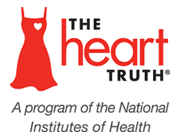
The Heart Truth - Lower Heart Disease Risk
How Do I Find Out if I Am at Risk for Heart Disease?
The first step toward heart health is becoming aware of your own personal risk for heart disease. Some risks, such as smoking cigarettes, are obvious: every woman knows whether or not she smokes. But other risk factors, such as high blood pressure or high blood cholesterol, generally don't have obvious signs or symptoms. So you'll need to gather some information to create your personal "heart profile."
You and Your Doctor: A Heart Healthy Partnership
A crucial step in determining your risk is to see your doctor for a thorough checkup. Your doctor can be an important partner in helping you set and
reach goals for heart health. But don't wait for your doctor to mention heart disease or its risk factors. Many doctors don't routinely
bring up the subject with women patients. Here are some tips for establishing good, clear communication between you and your doctor:
Speak up. Tell your doctor you want to keep your heart healthy and would like help in achieving that goal. Ask questions
about your chances of developing heart disease and how you can lower your risk. See "Questions To Ask Your Doctor" on
page 15 of The
Healthy Heart Handbook for Women ![]() (2.47MB). Also ask for
tests that will determine your personal risk factors. (See "Check It Out"
(2.47MB). Also ask for
tests that will determine your personal risk factors. (See "Check It Out" ![]() (46KB) on page 16 of The
Healthy Heart Handbook for Women.)
(46KB) on page 16 of The
Healthy Heart Handbook for Women.)
Keep tabs on treatment. If you already are being treated for heart disease or heart disease risk factors, ask your doctor to review your treatment plan with you. Ask: Is what I'm doing in line with the latest recommendations? Are my treatments working? Are my risk factors under control? If your doctor recommends a medical procedure, ask about its benefits and risks. Find out if you will need to be hospitalized and for how long, and what to expect during the recovery period.
Be open. When your doctor asks you questions, answer as honestly and fully as you can. While certain topics may seem quite personal, discussing them openly can help your doctor find out your chances of developing heart disease. It can also help your doctor work with you to reduce your risk. If you already have heart disease, briefly describe each of your symptoms. Include when each symptom started, how often it happens, and whether it has been getting worse.
Keep it simple. If you don't understand something your doctor says, ask for an explanation in simple language. Be especially sure you understand how to take any medication you are given. If you are worried about understanding what the doctor says, or if you have trouble hearing, bring a friend or relative with you to your appointment. You may want to ask that person to write down the doctor's instructions for you.
Next: What should I know about menopausal hormone therapy and heart disease?
Last Updated: February 29, 2012
















 Twitter
Twitter
 Facebook
Facebook YouTube
YouTube